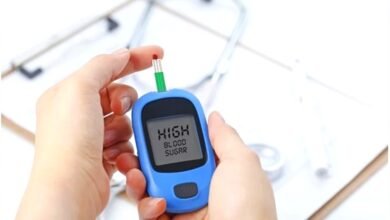Diabetes Treatments and Management: A Comprehensive Guide

In today’s world, where health and well-being are paramount, the effective treatment and management of diabetes are crucial pillars in pursuing a healthier life. Diabetes, a chronic condition characterized by elevated blood sugar levels, affects millions worldwide. However, with the right knowledge, resources, and strategies, individuals can lead fulfilling lives while effectively managing diabetes. This article embarks on a journey through the landscape of “Diabetes Treatments and Management,” shedding light on the diverse approaches, technologies, and lifestyle changes that empower those with diabetes to take control of their health.
Diabetes Treatments and Management
Diabetes is a multifaceted condition that demands personalized care and management. Whether you are dealing with Type 1 diabetes, Type 2 diabetes, or gestational diabetes, understanding the available treatment options and management techniques is essential. From insulin therapy to dietary adjustments, regular monitoring, and innovative technologies, this article will explore the comprehensive spectrum of strategies individuals, caregivers, and healthcare professionals can employ to navigate the path to effective diabetes management. Join us in this exploration of knowledge and empowerment as we delve into the world of “Diabetes Treatments and Management,” where informed choices and proactive steps pave the way to a healthier, happier life.
Lifestyle Modifications
Diet and Nutrition
Carbohydrate Counting
- Explanation of carbohydrate counting as a strategy for managing blood sugar levels.
- Tips on how to calculate and monitor daily carbohydrate intake.
Glycemic Index
- Understanding the glycemic index and its role in gradually choosing foods that affect blood sugar.
- Dietary recommendations based on glycemic index values.
Meal Planning
- Creating balanced meal plans for individuals with diabetes.
- The importance of portion control and meal timing.
Read More: Diabetic Patients Sugar-Free Cake Recipes
Physical Activity
Exercise Benefits
- How regular physical activity can improve insulin sensitivity and lower blood sugar levels?
- Types of exercises suitable for individuals with diabetes.
Exercise Guidelines
- Recommendations for frequency, duration, and intensity of physical activity.
- The importance of including both aerobic and strength-training exercises.
Weight Management
Body Mass Index (BMI)
- Understanding the relationship between obesity and diabetes.
- Setting realistic weight loss goals based on BMI.
Healthy Weight Loss Strategies
Tips for safe and sustainable weight loss for individuals with diabetes.
The role of a well-balanced diet and regular exercise in weight management.
Medications
Insulin Therapy
Types of Insulin
Diabetes Treatments and Management: Overview of different insulin types and their properties.
How to determine the right insulin regimen for individual needs.
Insulin Administration
Techniques for administering insulin through injections or insulin pumps.
Strategies for monitoring blood sugar levels while on insulin therapy.
Oral Medications
Metformin
Diabetes Treatments and Management: The most commonly prescribed oral medication for Type 2 diabetes.
How metformin works and potential side effects.
Other Oral Medications
Diabetes Treatments and Management: Overview of other classes of oral medications, such as sulfonylureas, DPP-4 inhibitors, and SGLT-2 inhibitors.
Indications, benefits, and potential side effects of each class.
Injectable Medications
GLP-1 Receptor Agonists
- Role of GLP-1 receptor agonists in diabetes management.
- Injection techniques and available options.
Amylin Analogs
- The function of amylin analogs in regulating blood sugar.
- How to use amylin analogs in conjunction with insulin therapy.
Blood Sugar Monitoring
Blood Sugar Monitoring
Diabetes Treatments and Management: Regular monitoring of blood sugar levels is a fundamental aspect of effective diabetes management. By tracking blood sugar levels, individuals with diabetes can make informed decisions about their treatment plans, lifestyle adjustments, and dietary choices. In this section, we explore two primary methods of blood sugar monitoring: self-monitoring and A1C testing.
Self-Monitoring
A. Blood Glucose Meters
Blood glucose meters are essential tools for individuals with diabetes, providing quick and convenient measurements of their current blood sugar levels. Understanding these meters’ different types and features is crucial for accurate monitoring.
- Types of Blood Glucose Meters: Explore the various types of blood glucose meters available, from traditional fingerstick meters to continuous glucose monitoring (CGM) systems, and understand their features and benefits.
- Accurate Blood Sugar Monitoring: Learn the importance of proper technique when using blood glucose meters to obtain reliable readings and how to interpret the results effectively.
Continuous Glucose Monitoring (CGM)
Diabetes Treatments and Management: Continuous glucose monitoring (CGM) systems offer a real-time and comprehensive view of blood sugar trends. These devices can be valuable tools for individuals seeking tighter control over their diabetes.
- The Benefits of CGM: Discover the advantages of CGM systems, including their ability to provide continuous data on blood sugar levels, detect trends, and alert users to high or low readings.
- Using and Interpreting CGM Data: Learn how to effectively use and interpret CGM data to make informed decisions about insulin dosing, meal planning, and lifestyle adjustments. Understand the importance of calibration and sensor placement for accurate results.
A1C Testing
What is A1C?
Diabetes Treatments and Management: A1C testing, also known as hemoglobin A1C or glycated hemoglobin testing, provides a valuable measure of long-term blood sugar control. It offers insights into an individual’s average blood sugar levels over the past two to three months.
- Understanding A1C: Explore what A1C is and why it is a critical indicator of long-term blood sugar control, making it a valuable tool for healthcare providers and individuals with diabetes.
- Target A1C Levels: Learn about recommended target A1C levels for individuals with diabetes and the significance of achieving and maintaining these targets for overall health.
Frequency of A1C Testing
Regular A1C testing is vital to diabetes management, as it helps track progress and guide treatment adjustments. The frequency of A1C testing may vary depending on individual circumstances.
- Testing Frequency: Understand guidelines for how often A1C tests should be performed based on factors like diabetes type, treatment plan, and overall blood sugar control.
- Using A1C Results: Gain insights into how healthcare providers use A1C results to assess treatment efficacy, set personalized goals, and make necessary adjustments to treatment plans.
Emerging Therapies
Diabetes Treatments and Management: In the ever-evolving landscape of diabetes research and treatment, several promising emerging therapies are on the horizon. These therapies show the potential to revolutionize diabetes management and improve the lives of individuals with the condition. Here, we explore two prominent emerging therapies: the Artificial Pancreas and Stem Cell Therapy.
Artificial Pancreas
Overview
Diabetes Treatments and Management: The artificial pancreas, also known as a closed-loop system, is an advanced technological solution designed to mimic a healthy pancreas’s functions, automating real-time insulin delivery and glucose monitoring. This revolutionary device aims to enhance blood sugar control and reduce the burden of diabetes management.
- How the Artificial Pancreas Works: Delve into the mechanics of the artificial pancreas, which combines an insulin pump and a continuous glucose monitor to regulate insulin delivery based on real-time glucose levels.
- Advantages of Automation: Explore the benefits of automation, including minimizing hypoglycemic episodes, optimizing glucose levels, and providing individuals with greater peace of mind.
Benefits and Challenges
- Advantages of the Artificial Pancreas: Understand how the artificial pancreas can improve glycemic control, enhance quality of life, and improve adherence to treatment plans.
- Challenges and Future Developments: Acknowledge the challenges, such as cost and accessibility, and look into ongoing research and future developments aimed at refining and expanding the use of artificial pancreas technology.
Stem Cell Therapy
Stem Cells and Diabetes
Diabetes Treatments and Management: Stem cell therapy represents a promising avenue for diabetes treatment by harnessing the potential of stem cells to regenerate damaged pancreatic cells and restore insulin production.
- Stem Cells and Their Potential in Diabetes: Gain insights into the potential of stem cells to differentiate into insulin-producing beta cells, potentially leading to a functional cure for diabetes.
- Current Research and Clinical Trials: Stay updated on the latest advancements in stem cell research, ongoing clinical trials, and their implications for diabetes treatment.
Potential Applications
- Regenerating Insulin-Producing Cells: Explore how stem cell therapy may offer the possibility of regenerating damaged or lost insulin-producing cells and restoring natural insulin production in individuals with diabetes.
- Ethical Considerations and Safety Concerns: Understand the ethical considerations surrounding stem cell research and therapy.
Read More: The Future of Diabetes Treatment: A Comprehensive Guide
Conclusion
Diabetes is a complex condition requiring a multifaceted treatment and management approach. Lifestyle modifications, including dietary changes and increased physical activity, are crucial in blood sugar control. Medications, such as insulin and oral agents, are essential for many individuals with diabetes. Regular blood sugar monitoring is crucial for tracking progress, and emerging therapies like artificial pancreas systems and stem cell therapy offer hope for the future.
Effective diabetes management involves collaboration between individuals with diabetes, healthcare providers, and support networks. With the right knowledge and tools, individuals can lead healthy lives and minimize the risk of complications associated with diabetes. By following the comprehensive guidance provided in this guide, individuals with diabetes can take control of their condition and work towards a brighter and healthier future.
FAQS
1. What is diabetes?
Diabetes is a chronic medical condition that affects how your body processes glucose (sugar) in your blood. It occurs when your body either doesn’t produce enough insulin or can’t effectively use the insulin it produces.
2. What are the different types of diabetes?
There are primarily two main types of diabetes: Type 1 and Type 2. Type 1 diabetes is an autoimmune condition where the body doesn’t produce insulin. Type 2 diabetes is characterized by insulin resistance, where the body’s cells don’t respond well to insulin.
3. What are the common symptoms of diabetes?
Common symptoms include increased thirst, frequent urination, unexplained weight loss, fatigue, blurred vision, slow wound healing, and recurring infections.
4. How is diabetes diagnosed?
Diabetes is typically diagnosed through blood tests, including fasting blood sugar tests, oral glucose tolerance tests, and A1C tests. Your healthcare provider will determine which test is most appropriate for you.
5. Can diabetes be managed through lifestyle changes?
Yes, lifestyle modifications are a cornerstone of diabetes management. This includes a healthy diet, regular physical activity, weight management, and monitoring blood sugar levels.







